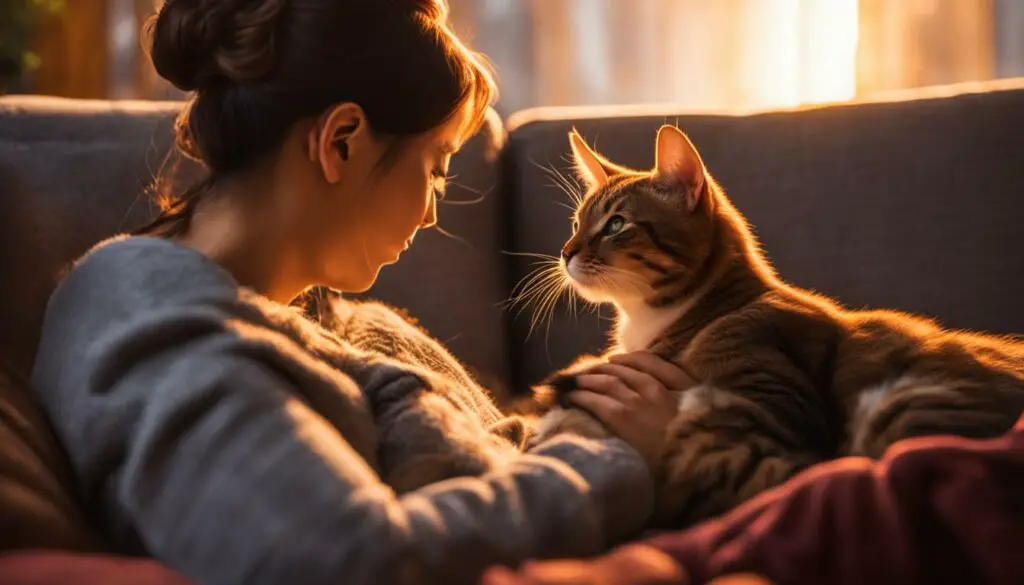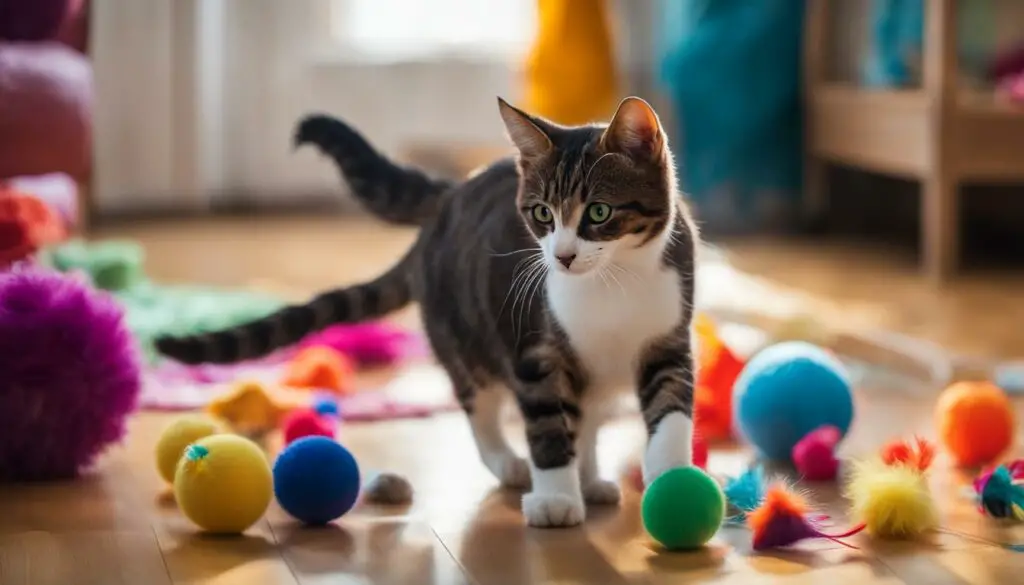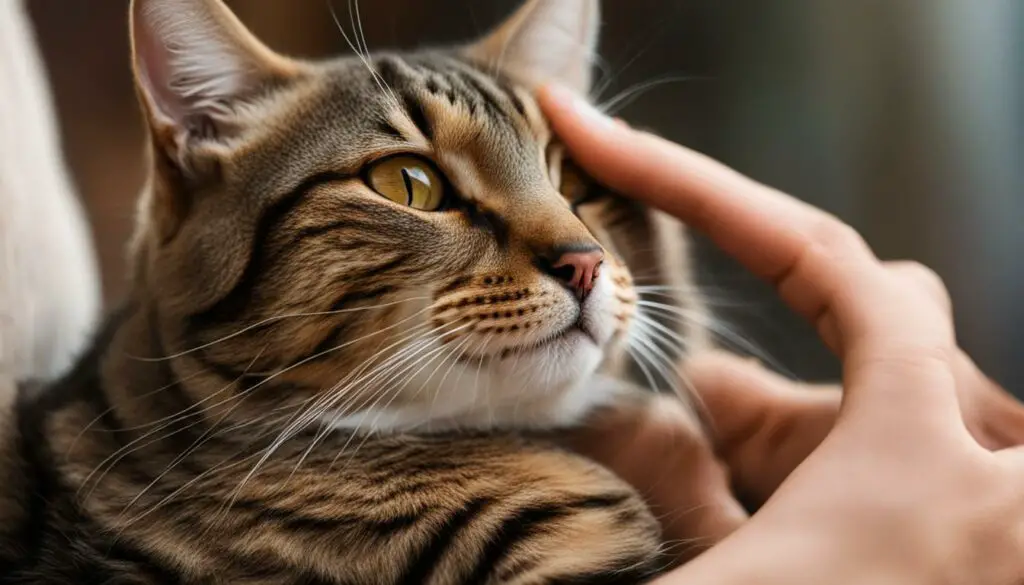As a cat owner, I’ve often wondered why my furry friend has a tendency to suckle on me. It’s a behavior that can be both endearing and puzzling at the same time. In this article, I’ll delve into the reasons behind cat suckling, exploring the nursing behavior, bonding, and comfort aspects that contribute to this unique feline behavior. Additionally, I’ll touch upon cat behavior problems that may arise from excessive or destructive suckling.
Key Takeaways:
- Cat suckling is a natural behavior exhibited by cats of all ages and breeds.
- It can be a form of bonding and comfort-seeking behavior.
- Cat behavior problems may arise if suckling becomes excessive or destructive.
- Understanding the underlying reasons for suckling can help in providing appropriate care and addressing any concerns.
- Consulting with a veterinarian or cat behaviorist may be necessary if the behavior persists or causes distress.
Why Does a Cat Suckle Into Adulthood?
Adult cat suckling is a behavior that may seem unusual to some cat owners, but it is actually a natural instinct that can be carried over from kittenhood. Cats often engage in suckling behavior as a source of comfort and to fulfill their innate need for nurturing. It is not uncommon for cats to redirect this behavior towards humans, particularly their owners, as a way to form a strong bond and seek reassurance.
Stress can also play a role in cat suckling into adulthood. Cats may suckle as a way to self-soothe and cope with anxiety or other stressful situations. This behavior provides them with a sense of security and comfort in times of distress. Additionally, certain cat breeds, such as Oriental breeds, may have a genetic predisposition for suckling behavior, making them more prone to engaging in this behavior throughout their lives.
The weaning experience during kittenhood can also contribute to adult cat suckling. Cats that were weaned too early or had a negative weaning experience may develop a strong attachment to suckling and continue the behavior into adulthood. These cats may find comfort and satisfaction in suckling activities, even if they have been separated from their mother.
Why Does a Cat Suckle Into Adulthood?
| Factors | Contributing Factors to Adult Cat Suckling |
|---|---|
| Natural Instinct | Seeking comfort and fulfilling nurturing needs |
| Stress | Self-soothing behavior in times of anxiety or stress |
| Genetics | Predisposition in certain cat breeds, such as Oriental breeds |
| Weaning Experience | Early weaning or negative weaning experience leading to attachment to suckling behavior |
While adult cat suckling is generally harmless, it is important for cat owners to be aware of any excessive or destructive suckling behaviors. If the behavior becomes problematic or causes distress to the cat, it is recommended to consult with a veterinarian or a cat behaviorist for guidance. They can assess the underlying reasons for the behavior and provide strategies to manage or redirect it, ensuring the well-being of both the cat and the owner.
Is Cat Suckling a Symptom of a Disease?
While cat suckling behavior is generally not a symptom of a specific disease, it can be indicative of underlying behavioral disorders or emotional issues. Cats may engage in excessive suckling due to a lack of environmental stimulation, anxiety disorders, stress, or even pain. It is important for pet owners to understand the potential causes behind this behavior to ensure their cat’s well-being.
Behavioral disorders, such as a lack of environmental stimulation, can lead cats to seek comfort and self-soothing behaviors like suckling. Cats that do not have adequate mental and physical stimulation may resort to this behavior as a way to cope with boredom or frustration. In some cases, anxiety disorders can also trigger excessive suckling, as cats may use it as a way to alleviate their stress and anxiety.
Additionally, cats that are experiencing pain, whether it be from dental issues, gastrointestinal problems, or other health concerns, may engage in suckling behavior as a means of self-soothing. It is important to monitor your cat’s overall health and seek veterinary care if you suspect that pain may be a factor contributing to their suckling behavior.
Key Factors Contributing to Cat Suckling Behavior:
- Lack of environmental stimulation
- Anxiety disorders
- Stress
- Pain

Understanding the potential underlying causes of cat suckling behavior is crucial for pet owners to address any potential concerns. If you notice your cat engaging in excessive or destructive suckling, it is recommended to consult with a veterinarian who specializes in feline behavior. They can help determine the root cause of the behavior and provide guidance on how to manage and address it effectively.
By addressing any underlying behavioral or emotional issues and providing appropriate care and environmental enrichment, you can help ensure that your cat’s suckling behavior is managed in a way that is both healthy and beneficial for their overall well-being.
What Should You Do About Cat Suckling?
In most cases, cat suckling is a harmless behavior that provides comfort and contentment to the cat. It is generally best to accept it as a normal behavior. However, if the behavior causes excessive stress or leads to ingestion of harmful objects, you can take steps to reduce or eliminate the behavior.
One approach to reducing stress and redirecting the cat’s attention away from suckling is to provide alternative objects for the cat to suckle on. This can include soft toys or blankets that mimic the texture and feel of a nursing mother. By offering these items, you can provide the cat with a suitable outlet for their suckling behavior.
Mental stimulation can also play an important role in reducing cat suckling. Engaging your cat in play sessions, providing puzzle toys, or introducing interactive feeding methods can help satisfy their natural instinctual needs and redirect their focus away from suckling. Additionally, providing environmental enrichment, such as vertical spaces and hiding spots, can help alleviate stress and promote overall well-being.
If the suckling behavior persists despite these efforts, it may be beneficial to consult with a veterinarian or cat behaviorist. They can provide further guidance and explore the possibility of using veterinary medications to reduce anxiety or stress-related behaviors. A professional can also assess the cat’s overall behavior and environment to provide individualized recommendations for managing the suckling behavior effectively.
| Acceptance | Reducing Stress | Providing Alternative Objects | Mental Stimulation | Veterinary Medications | Cat Behaviorist |
|---|---|---|---|---|---|
| Accept the suckling behavior as normal | Provide environmental enrichment to reduce stress | Offer soft toys or blankets as alternative suckling objects | Engage in play sessions and provide mental stimulation | Consult with a veterinarian for medication options | Seek guidance from a cat behaviorist for specialized advice |
How to Make Sure Your Cat’s Needs Are Being Met
Meeting your cat’s environmental needs is crucial to ensure their overall well-being and prevent behavioral issues such as suckling. By creating a cat-friendly environment and addressing their specific needs, you can help reduce stress and promote a healthy and happy life for your feline companion.
Creating a Cat-Friendly Environment
To meet your cat’s environmental needs, consider the following:
- Provide separate areas for eating, elimination, and sleeping. Cats value privacy and having designated spaces for these activities can help reduce stress.
- Offer hiding spaces and vertical escape areas. Cats feel more secure when they have places to retreat to and observe their surroundings from a higher vantage point.
- Ensure the litter box is clean and easily accessible. Cats are very particular about their elimination habits, and a clean litter box is essential for their comfort.
- Provide scratching posts and toys. These items help fulfill your cat’s natural instincts and provide mental and physical stimulation.
- Offer a variety of textures and surfaces for your cat to explore and scratch. This can include sisal, carpet, and cardboard scratchers.
Stress Reduction Techniques
Reducing stress in your cat’s environment can help prevent or alleviate suckling behaviors. Consider the following techniques:
- Use synthetic pheromones. These products mimic the natural scents that cats produce when they feel calm and content. Diffusers, sprays, or collars containing synthetic pheromones can help create a calming atmosphere.
- Provide extra attention and playtime. Spending quality time with your cat and engaging in interactive play sessions can help reduce stress and provide mental stimulation.
Consider Adopting Another Cat
In some cases, adopting another cat as a playmate can be beneficial. Cats are social animals and having a feline companion can provide them with companionship and mental stimulation. However, it is important to introduce new cats gradually and ensure they get along before making the decision to add another cat to your household.
By addressing your cat’s environmental needs, reducing stress, and providing mental stimulation, you can help ensure that your cat’s needs are being met and reduce the likelihood of suckling behaviors. Remember to consult with a veterinarian or a cat behaviorist if you have any concerns or questions regarding your cat’s behavior.

Conclusion
Understanding why cats suckle on humans is crucial for proper pet care. While cat suckling is a natural behavior, it can be influenced by various factors such as instinct, comfort, stress, genetics, and weaning experiences. As a pet owner, it is important to be attentive to this behavior and take appropriate steps to ensure the well-being of your furry friend.
Cat suckling is generally harmless, but excessive or destructive suckling should be addressed. By meeting the environmental and emotional needs of cats and providing appropriate objects for suckling, you can help redirect or reduce the behavior. It is also advisable to seek professional guidance from a veterinarian or cat behaviorist when necessary.
Proper pet care involves meeting the unique needs of your cat. Create a cat-friendly environment that provides separate areas for eating, elimination, and sleeping. Include hiding spaces and vertical escape areas to promote their sense of security. To minimize stress, consider using synthetic pheromones or spend extra time giving attention and engaging in play activities. Providing mental stimulation through play and interaction with other cats can also satisfy their natural instincts.
By understanding and addressing cat suckling behavior, you can ensure your furry companion is happy and healthy. Pay attention to their needs, seek professional guidance when necessary, and provide a loving and stimulating environment. With your care and attention, you can strengthen the bond with your cat and create a harmonious living space for both of you.
FAQ
Is cat suckling a normal behavior?
Yes, cat suckling is a natural instinct that can be carried over from kittenhood and provides comfort to cats.
What are the reasons behind cat suckling?
Cat suckling can be attributed to factors such as instinct, comfort, stress, genetics, and weaning experiences.
Is cat suckling a symptom of a disease?
Cat suckling is generally not a symptom of a specific disease, but it can be a sign of behavioral disorders or underlying medical causes.
How can I address excessive cat suckling?
If cat suckling causes excessive stress or ingestion of harmful objects, you can provide alternative objects for suckling, offer mental stimulation, and consult with a veterinarian or cat behaviorist if needed.
How can I meet my cat’s environmental needs to prevent suckling behavior?
Providing separate areas for eating, elimination, and sleeping, as well as hiding spaces and vertical escape areas, can contribute to a cat’s well-being. Minimizing stress with synthetic pheromones, extra attention, and playtime can also help reduce suckling behaviors.
What should I do if my cat continues to suckle excessively?
If your cat continues to suckle excessively or exhibits destructive behavior, it is recommended to seek professional guidance from a veterinarian or cat behaviorist.
Source Links
- https://be.chewy.com/how-can-i-stop-cats-suckling-behavior/
- https://petmd.com/cat/behavior/your-cat-suckling-adult
- https://coleandmarmalade.com/2019/08/28/is-your-adult-cat-still-suckling-find-out-why-here/








